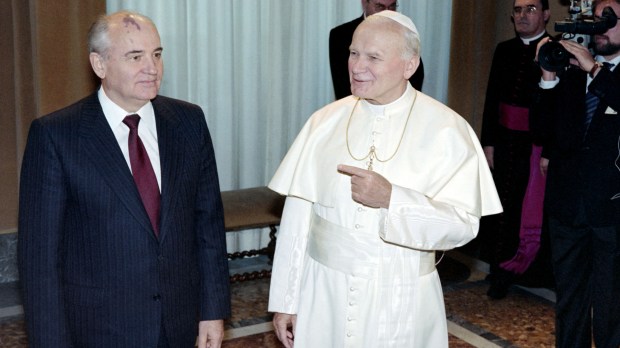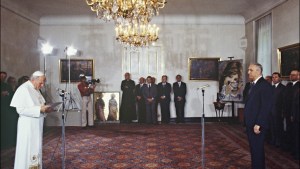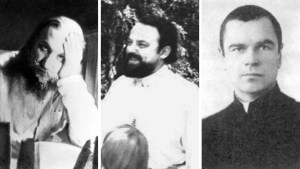During a 1984 visit to Great Britain, Mikhail S. Gorbachev enjoyed a largely warm reception, as he would elsewhere in the West. Even Prime Minister Margaret Thatcher, the “Iron Lady,” was taken by the Soviet reformer’s personality, so different from previous leaders of the USSR.
“I like Mr. Gorbachev,” Thatcher said at the time. “We can do business together.”
But when a British lawmaker brought up the issue of persecution of religious groups in the Soviet Union, Gorbachev snapped back, “You govern your society. You leave us to govern ours.”
Five years later, much had changed, and in a historic meeting at the Vatican, Gorbachev seemed anxious to inform Pope John Paul II how the Soviet Union now welcomed the religious element of society in its midst.
Gorbachev, who had been baptized in secret as a child but never admitted to being a Christian, died Tuesday in Moscow at the age of 91. His legacy of reform of the old Soviet Union, according to commentators and analysts reacting to his death, had been largely undone by President Vladimir V. Putin. But the opening up to religious life in the Soviet sphere has endured.
“In a stark departure from the Soviet history of official atheism, he established formal diplomatic contacts with the Vatican and helped promulgate a law on freedom of conscience,” his obituary in the New York Times pointed out.
Gorbachev’s meeting with John Paul was the first time a top leader of the Soviet Union had ever met with the head of the Catholic Church. He was general secretary of the Communist Party of the Soviet Union at the time. In his initial statement at the December 1, 1989, meeting, he declared that people of faith “have a right to satisfy their spiritual needs.”
In fact, seemingly timed to coincide with the Vatican encounter, officials in the Ukrainian SSR a day earlier had announced that the long-suppressed Ukrainian Greek Catholic Church was now free to register congregations with the government, paving the way for the faithful to come out of their underground existence and for churches that had been appropriated by the government or Russian Orthodox Church to be given back to their rightful owners.
Ukrainian Catholics were the largest group that concerned Pope John Paul during his private 70-minute meeting with Gorbachev. A transcript of that meeting, released in 2009 by the National Security Archive, an independent institute in Washington, revealed that he also lobbied for Latin Catholics in Lithuania and Latvia, as well as persecuted groups of Protestants, Jews, and Muslims throughout the Soviet Empire.
“We are waiting anxiously and with great hope for your country to accept a law to uphold freedom of conscience. We hope that the introduction of such a law would broaden the possibility for religious life for all Soviet citizens,” the pope said. “The situation of the [Ukrainian Greek Catholics] is of particular concern both for me and for the Holy See: for over 40 years that have passed since the end of the war they have been denied the fundamental right of religious freedom, they have been practically put outside the law. We hope that the new law for the freedom of conscience will create for them, as for all believers, the opportunity to openly practice their religion and have their own church structures.”
For his part, Gorbachev couched the new openness to faith in the Soviet sphere in the context of his program of glasnost and perestroika.
“In light of the changes taking place we believe that it is necessary to respect the internal world of our religious citizens,” he told the pontiff. “The majority of believers in our country — including the Orthodox, Muslims, and Catholics — support perestroika. In the near future the USSR Supreme Soviet will pass the freedom of conscience law. We are interested in having different religions contribute to the renewal and humanization of our society.”
War and peace
The pope also recognized Gorbachev’s work with US Presidents Ronald Reagan and George H.W. Bush, during whose administrations several arms control treaties with the Soviet Union had been hammered out.
“Naturally, the main problem that interests all of humanity is the question of war and peace,” the pope said. “We are grateful to God that lately the danger of war has decreased and the tension in relations between the East and the West has gone down. We know and value highly your work for the sake of world peace and wish it a good continuation.”
The Russian president expressed his hope that the pope would be able to visit the USSR, to which John Paul responded, “If this were allowed, I would be very glad to.”
Pope John Paul’s hoped-for visit to the Soviet Union never became a reality. But Gorbachev was able to visit the pontiff again in 1990, this time as President of the USSR. By then, his government had passed the law on freedom of religion abolishing restrictions on Churches, and the Vatican and the Soviet Union had restored formal diplomatic relations for the first time since 1923.



